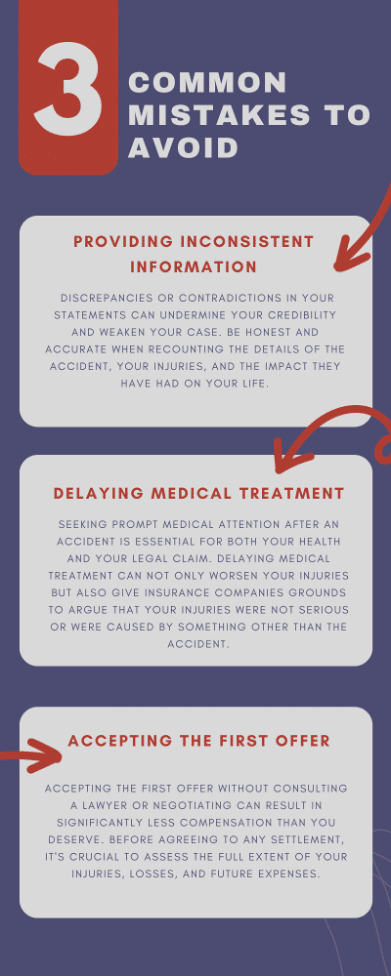Imagine you’re driving home from work when suddenly, another car runs a red light and smashes into your vehicle. The impact leaves you with serious injuries, mounting medical bills, and the inability to work. During such times, you seek assistance from your insurance company, only to face a denial of your rightful claim. This scenario is one that no one wants to face, yet it occurs far too often.
Suffering an injury is not only physically and emotionally taxing but can also lead to financial burdens, especially when insurance companies deny rightful claims. Amidst such distress, it’s crucial to understand your rights and navigate the complexities of personal injury law to secure the compensation you rightfully deserve. In this guide, we’ll delve into effective strategies to overcome insurance denials and ensure you receive fair recompense for your injuries.
Understanding Personal Injury Claims
When you’re injured due to someone else’s negligence, whether it’s a motor vehicle accident, a workplace mishap, or a slip and fall incident, you have the right to pursue compensation through a personal injury claim. This legal avenue allows you to pursue financial recovery from losses resulting from the injury including medical expenses, rehabilitative care, ongoing treatment, and potential future medical needs.
Moreover, you can also recover lost wages due to time away from work, considering diminished earning capacity resulting from long-term disabilities or impairments. Additionally, it provides a means to seek compensation for intangible damages such as pain and suffering, emotional distress, and loss of enjoyment of life, recognizing the full extent of the harm endured.
Injury While on Vacation
Experiencing an injury while on vacation can compound the challenges of pursuing a personal injury claim, especially when dealing with unfamiliar laws and jurisdictions. For instance, in areas like Myrtle Beach where millions of visitors flock over each year, car accidents are unfortunately quite common. Seeking advice from a car accident lawyer in Myrtle Beach can be invaluable in such circumstances. These local attorneys possess a deep understanding of the area’s traffic laws and insurance regulations, enabling them to provide tailored guidance to the victims of the accident. Additionally, it’s essential to seek immediate medical attention and document the incident thoroughly.
Navigating Insurance Denials
Despite the inherent power of a personal injury claim, insurance companies often employ various tactics to minimize payouts or outright deny valid claims, leaving victims feeling powerless and financially strained. These tactics may include disputing the severity or causation of injuries, pressuring claimants into accepting lowball settlement offers, or exploiting legal technicalities to reject claims altogether. As a result, many injury victims find themselves grappling with feelings of helplessness and financial strain.
In the face of an insurance denial, it’s crucial to remain proactive and seek legal guidance from a reputable personal injury lawyer. These legal professionals specialize in personal injury law and are adept at negotiating with insurance companies to ensure fair treatment for their clients. By enlisting the service of a skilled attorney, you significantly enhance your chances of overcoming denials and securing the compensation you deserve.
The Role of a Personal Injury Lawyer
A personal injury lawyer serves as your advocate throughout the claims process, fighting tirelessly to protect your rights and secure fair compensation. From gathering evidence and negotiating with insurance adjusters to representing you in court if necessary, a skilled attorney plays a pivotal role in maximizing your chances of a successful outcome. By entrusting your case to a reputable personal injury lawyer, you gain peace of mind knowing that your best interests are being safeguarded every step of the way.
| Stage of Claims Process | Description |
| Initial Consultation | During this meeting, the lawyer evaluates the case, gathers relevant information about the accident, injuries, and damages, and discusses the legal options available to the client. |
| Investigation | This may involve collecting evidence such as medical records, police reports, witness statements, photographs, and any other pertinent documentation to support the client’s claim. |
| Legal Analysis | To assess liability and determine the strength of the claim, they review applicable laws, regulations, and precedents to identify legal theories and strategies that may support the client’s position. |
| Demand Letter | The demand letter outlines the client’s injuries, damages, and the legal basis for the claim, and requests a settlement amount that adequately compensates the client for their losses. |
| Negotiation | Upon receiving the demand letter, the insurance company may enter into negotiations with the lawyer to reach a settlement. The lawyer advocates on behalf of the client, presenting evidence, and making persuasive arguments to maximize the settlement offer and secure fair compensation. |
| Litigation (If Necessary) | If a fair settlement cannot be reached through negotiation, the lawyer may file a lawsuit on behalf of the client. This initiates the litigation process, which involves pre-trial discovery, motion practice, and ultimately, a trial where the case is presented before a judge and jury for resolution. |
| Settlement or Verdict | During litigation, parties may continue to negotiate for a settlement. If an agreement is reached, the case is resolved without going to trial, and the client receives compensation. If the case proceeds to trial, the judge or jury will render a verdict determining liability and awarding damages to the prevailing party. |
| Appeals (If Applicable) | Appeals involve presenting arguments to a higher court challenging the trial court’s decision, prioritizing the client’s interests in seeking justice and fairness. When the client decides to appeal, their legal team works diligently to scrutinize the trial proceedings, identifying any potential errors that may have impacted the outcome. |
| Conclusion | The claims process concludes with either a settlement agreement or a court verdict. Once compensation is obtained, the lawyer ensures that all legal and financial matters are properly addressed, and the client’s rights are fully protected. The lawyer may also provide guidance on any further steps the client may need to take, such as medical treatment or financial planning. |
Maximizing Personal Injury Compensation
Personal injury protection (PIP) laws vary by state, but in general, they are designed to provide coverage for medical expenses and lost wages regardless of who was at fault for the accident. However, insurance companies may still attempt to undervalue or deny PIP claims, necessitating legal intervention to rectify the situation. A knowledgeable attorney can be instrumental in maximizing your personal injury compensation. By understanding the intricacies of PIP laws and insurance company tactics, they can effectively advocate for your rights and work towards securing the maximum compensation available under the law.

Taking Legal Action
If negotiations with the insurance company prove unsuccessful, filing a personal injury lawsuit may be necessary to pursue the compensation you deserve. A personal injury lawsuit allows you to present your case before a judge and jury, seeking damages for your injuries and holding the negligent party accountable for their actions. While litigation can be daunting, having a knowledgeable attorney by your side can help navigate the complexities of the legal system and increase your chances of a favorable verdict.
Conclusion
Dealing with insurance denials in the aftermath of an injury can be incredibly frustrating, but it’s essential to remember that you have rights and options available to you. By seeking legal representation from a reputable personal injury lawyer and remaining proactive in pursuing your claim, you can overcome insurance denials and secure the compensation you rightfully deserve. Don’t let insurance companies dictate the outcome of your claim—take control of your situation and fight for the justice you’re entitled to.
FAQs
How can I determine if my insurance claim has been wrongfully denied?
- You can determine if your insurance claim has been wrongfully denied by reviewing your policy, gathering evidence to support your claim, and seeking legal advice if necessary.
What steps should I take if my insurance company offers a settlement that seems inadequate?
- If your insurance company offers a settlement that seems inadequate, you should carefully review the offer, consider consulting with a personal injury lawyer, and negotiate for a fairer compensation amount.
How can a personal injury lawyer help me navigate the complexities of insurance denials and maximize my compensation?
- A personal injury lawyer can help you navigate insurance denials by advocating for your rights, negotiating with the insurance company on your behalf, and representing you in court if needed to ensure you receive the compensation you deserve.
